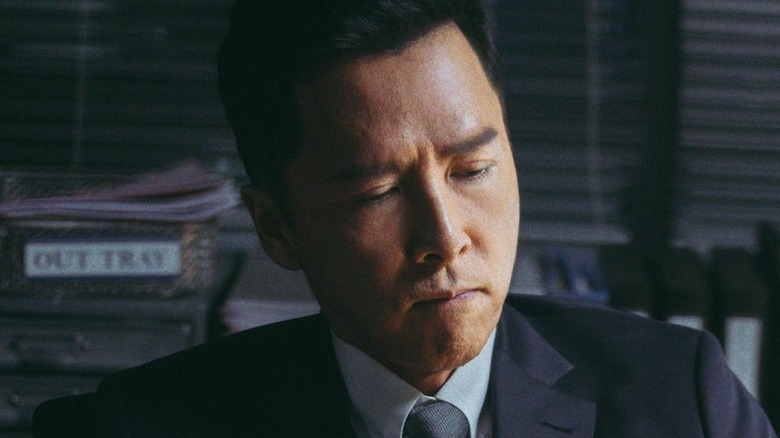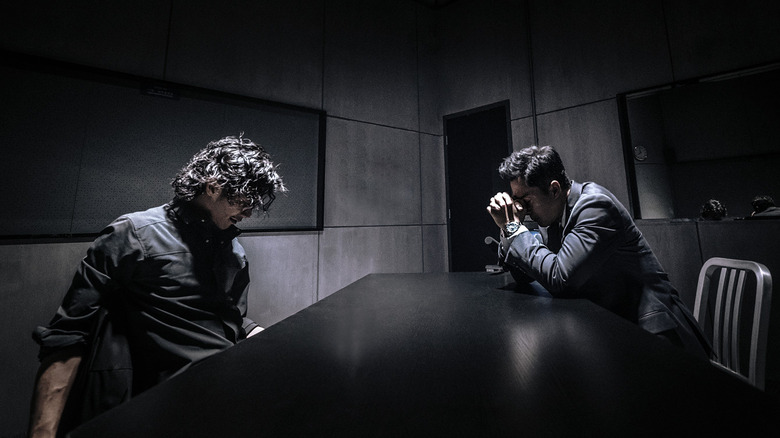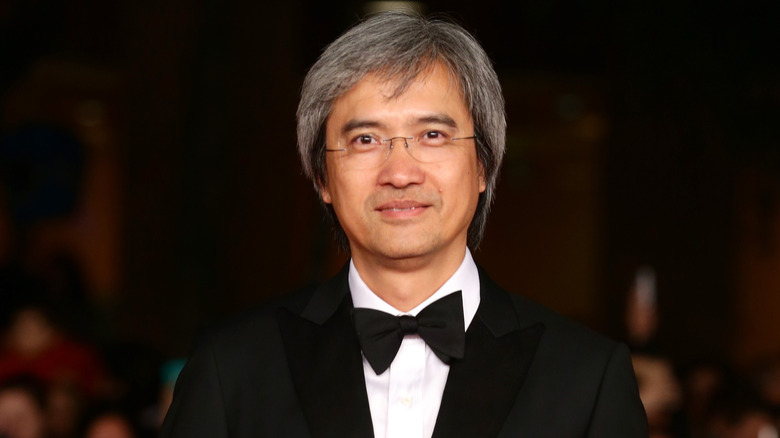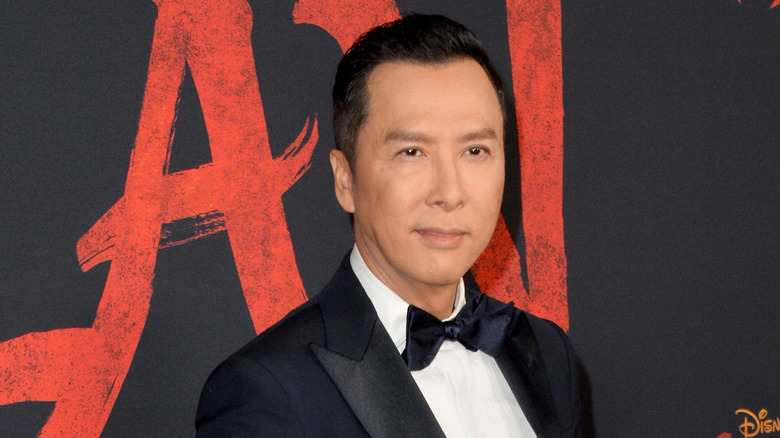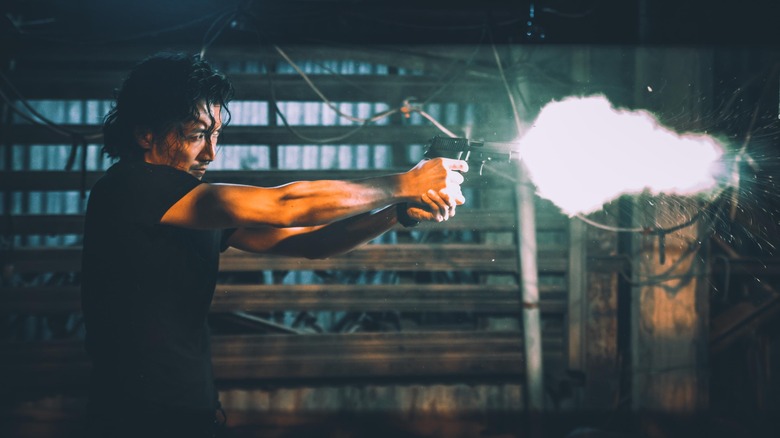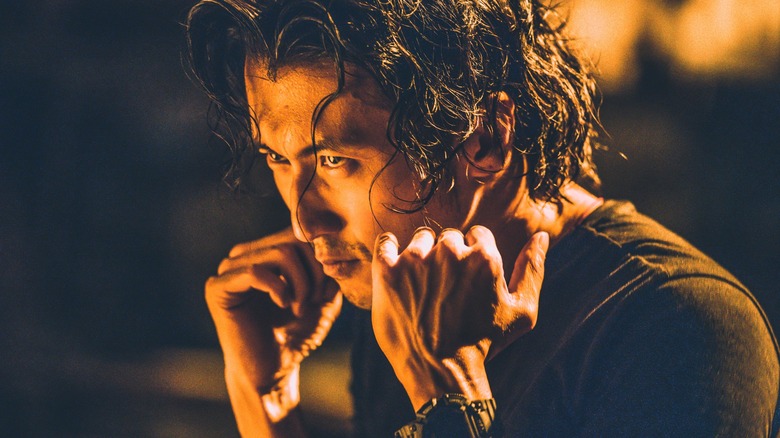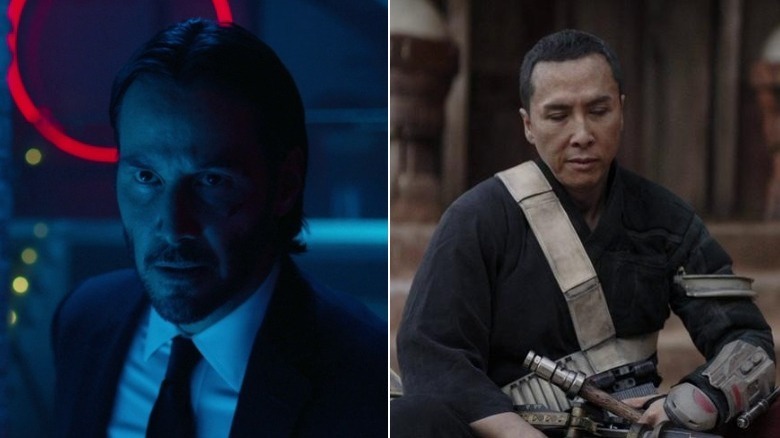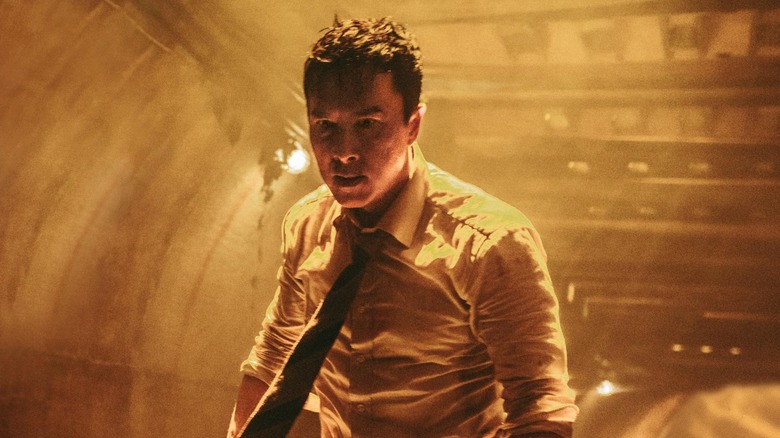Donnie Yen Talks Raging Fire, Action Movies, And John Wick 4 - Exclusive Interview
"Raging Fire" is the newest Donnie Yen film, though it's a touch different from what many viewers expect out of a "Donnie Yen film." Don't just take our word for it: Yen told us the same thing himself.
Bong (Yen) is a straight-and-narrow police officer who ends up on a collision course with Ngo (Nicholas Tse), a former protege now on the wrong side of the law — and seeking revenge. In this role, Yen isn't exactly an everyman, but he takes far more of a beating than usual. "Raging Fire" is also the final work from director Benny Chan, a Hong Kong filmmaking legend who died in August of 2020. Chan completed shooting, but was too ill to oversee post-production.
Looper spoke with Donnie Yen over Zoom, with him calling in from Berlin while working on his next movie. He walked us through his favorite scenes, paid tribute to Chan, and broke down the difference between Hong Kong and American action movies. He also told us a little bit about "John Wick 4" and spoke about his love of "Star Wars."
Coordinating fights and taking a punch
There's fist fights and there's fire fights — which are more difficult to coordinate in a movie like this?
Well, it really depends, because for this particular movie, it is the fist fight. Because as you watch the film, the final battle is between me and Nick, my co-star, so we need to build that out. And it's the most difficult ... I guess it's very difficult to do between two persons just fighting each other, and trying to reach that kind of maximum entertainment. Especially when you have all these other effects going on, like blowing up the whole street, and car chases and bullets flying, with all the sound effects in the theaters. It could easily kind of drag the pacing down. So from the very beginning, I knew that was my hardest task — how do you keep that expectation, and that adrenaline, and that drama and keep driving up to the top, after 15 minutes of a spectacular big action set piece, right?
That's the hardest for this movie. But sometimes it really depends on what you're looking for. Anything could be very difficult, if you're looking for a breakthrough from the smallest two-person fighting in the elevator scene to blowing up the whole building. So it's the creative goal, and aim, and what are you trying to do with that set, that scene?
And you get beat up a lot in this movie. You obviously come out on top almost every time, but you take some real punishment. And one of my favorite scenes in the movie is when you're looking in the mirror at all the bruises you got. What's the importance of taking a beating in scenes, in an era when a lot of people in Hollywood are negotiating to get hit less?
Well, it's really dependent on your role. When I created this role, this role is a balance between normal Donnie Yen films where you see me kick ass, and certain action, wild choreography coming out of watching my films. Having that at the same time, tackling more of a real character is slightly different from, I don't know if you've seen my previous films with similar roles playing a cop, "Flash Point," or "SPL," or "Kill Zone” in the past. Those films were more of, I wouldn't say cult films, but "Kill Zone" is more of a stylistic, artistic film. And "Flash Point" is more of a genre film, where obviously it was a much smaller budget film with "Flash Point" compared to "Raging Fire."
So the focus was more on just creating those characters in that film in "Flash Point," as well as at the time I was trying to ... I know what I have to deal with for entertainment, I spent a lot of days, and shooting days and focus on to creating that kind of MMA fight in those films. In this film, it's a combination of everything, having the Donnie Yen vehicles, the fighting and contemporary fighting, combat, all that stuff. But it's also kind of like a "Heat," "Training Day" type of film, where real character is the priority. So real character, and mix it up with Donnie Yen, when you go see a Donnie Yen film, you're going to have the punch, you're going to have certain wow factors.
Having that character grounded, he needs to get beat up. It's not "Ip Man" — when you watch "Ip Man" it's different, right? It's a kung fu master, it's a traditional film, where it's not a contemporary, modern film, where the audience can relate reality so quickly, like, "Oh, that would happen to me walking down the street." But if you watch an "Ip Man" film, it's a colorful movie, where it's a little bit surreal to most audiences, because it's not an everyday-like world to them. So you can go over the top, you can do like 900 punches and people wouldn't question it. But a movie like "Raging Fire," the audience has seen it a thousand times, they've seen "Heat," they've seen "Training Day," they know all these, "Departed," they know what's going on. So I think that the art in the beginning, it was trying to make that balance between those expectations level, and at the same time trying to keep the characters grounded.
Heat moments and remembering Benny Chan
It's very interesting you brought up "Heat," because one of the things I saw is when you and Nick were talking at the memorial site, that reminded me a lot of the scene when Pacino and De Niro meet in the diner. Was that a deliberate influence?
That was a deliberate influence by my late director friend, Benny Chan. I don't know if you know the backstory, but I met Benny 20-something years ago — we collaborated on two TV series at the time, 1996 or '97, and those two series became a classic hit. But since then we never worked together again — he directed other films, I went on to do my own films. But we see each other all the time in common post-production houses, we cross paths, and we kind of chat to each other and say, "Oh, I'm going to go do another film." And it went by, 20-something years later. A few years ago, I did a movie called "Chasing the Dragon" where I played this drug lord, Crippled Ho. And there wasn't much action in it, but I just played this kind of Pablo Escobar, old-time gangster mafia boss.
He saw the film and he loved it. And he called me up and said, "Ah, I loved your performance, let's do another film together." So we came up with a story. A completely different story from "Raging Fire." It was going to take place in Mexico. In fact, the whole production team, my stunt coordinator, my team, went with Benny to Mexico for location scouting, and came back and we were ready to go. Then the film company and investor in Hong Kong pulled the plug — at the time they were saying that the production cost, the budget was too high. They didn't want to take that risk.
So Benny was bummed out for a week. And I encouraged him, I said, "You know what? Just think of another story." One week, he came back with another story, and we went back to "Raging Fire." So all from beginning to the end, he always wants to make that. I guess he's an old timer, we all grew up with these kinds of films, "Heat," De Niro, Pacino, we all love these characters. In fact, a lot of people don't understand, a lot of old time Hong Kong actors, the really popular films, they were all — including myself — influenced by all these classic, great actors like De Niro and Pacino, and all of them. So when he came out, we all wanted it, why shouldn't we do a "Heat" moment? So it was Benny's thing, Benny wanted to do a "Heat" moment. And as you pointed out, those two scenes, the shootout, the cemetery scene, they were totally inspired by "Heat."
So tell me a little bit about Benny. You've mentioned him before, but at the end of the movie, they show that tribute to him where he's always all smiles. And I wouldn't say goofing around, but clearly wanted everybody to have a fun time. Would you say that's what Benny was really like?
He's just a really cool guy to be with, as much as he's a big-time director and he's been around for ages. As you know, making films is stressful, especially making action films. My culture — making Hong Kong films itself — our culture is a lot of yelling, a lot of cursing on the set, a lot of heated moments, that's how we make films. There's no quiet moment in Hong Kong. We yell, we curse, we scream at each other. That's how our culture has always been. But Benny is one director that, out of all these directors that I know, that can keep his cool. He's always smiling, even when he's yelling at you, or when he screams. He doesn't scream, he's smiling and he gets his point across. So he's always been that kind of gentleman, and very friendly. That's just his beautiful, beautiful nature, and beautiful personality.
I'm really glad he got to make this. And I'm very sorry for your loss on this, he definitely sounds like an amazing person.
Yeah, he is, he was.
Translations and Hong Kong culture
You mentioned cursing. A lot of times, Bong in the movie will say things like, "Are you farting with me?" And a friend of mine who speaks Cantonese actually watched this film the other day, and said that's actually basically what you're saying in Cantonese.
I don't recall the exact lines. My English, I believe, is decent enough to understand the exact translations. And so far we haven't had one good translation, I haven't seen any good translation. I don't know why, I brought that up to our industry for decades. Every time you see our subtitles, it's always off track. I don't understand. Maybe in my next few movies, I will pay a little bit more attention and make sure that I'll pose more of those ... Whoever did the translation, better find somebody with better English. So far, I'm surprised you said one of the lines were quite accurate, but maybe it was more accurate in the sense of it was the exact translation, but not the exact meaning. Sometimes the exact translation might come off so different.
So yeah, anyway, so hopefully we can elevate this, so everybody else that doesn't understand Chinese can appreciate what the hell we're saying. And I've read some critics, and read some reviews, and I'd like to give it a defense. Some critics wrote about how certain people act, for example, certain scenes between, maybe in the courtroom, or certain melodrama scenes. And they find it a bit over top, or too melodramatic. Well, that's because a lot of these critics, the writer doesn't understand Chinese culture. A lot of Chinese, that's how we act, that's how we talk. I think they should give it a fair judgment, to maybe take that into consideration, you have to understand different cultures have different ... The value of things, and how they behave.
I don't want to talk too much about reviews, but I noticed a big difference in reviews between people who were just assigned the movie or just watching that movie because they thought it might be interesting, and reviews by people who are very familiar with Hong Kong action movies. Two very different reviews from those two different groups.
Yeah.
I can't speak to the exact translation, but my friend who speaks Cantonese said that when you were saying "farting," you were basically saying kind of replacement words, non-curse words, trying to appear a little more upstanding. Was that accurate?
I don't recall the exact line. Whatever I said in there, I try to push certain limits. There's censorship elements with Chinese language films, opposed to American import films, which play both in mainland China and everywhere else. I don't understand the censorship myself. Sometimes I make my complaint to some of the Hong Kong censorship. In American films, you can curse, you can say F words, you can say all those words, that's okay. But in a Chinese film, that is "no, no, no," that's for rated "R, R, R" films.
So for us to have a massive, more of a wider audience demographic, sometimes we limit what we can say. And sometimes it hurts our performance. Like when you watch "Training Day" or "Heat," you hear people say, "F this," it's real, people do curse. But in Chinese films, sometimes we can't, so we push that limit by replacing it with more of a, "You bastard." At the most it's, "S—." But you can't say F-words, or you'll be categorized as a really rated R film.
Hong Kong action vs. American action
You started by mentioning the final fight scene, and I love the choreography in that final fight. And I don't want to get too much into it because our readers might not have seen the movie, but I don't think it's a spoiler to say an action movie ends with a final fight. And the actual scene felt very UFC, very mixed martial arts. In fact, it felt a little bit like professional wrestling at times because of the power struggle changes, and the way you were grappling with each other...
Well, that's the thing. For the longest time, the way we make action movies with martial arts, or any kind of combat action movies, a lot of these, they were created, choreographed — later on it was photographed by a lot of maybe specialists, but it was directed, edited, the way they placed the camera, by basically non-martial artists, up to now, because that's how the system works. A martial arts choreographer or fight choreographer, not only in Western Hollywood but in any culture, is considered a technician, is considered a choreographer, like a band's choreographer. They were never given the full assets to visualize through the way they see how it plays out.
Hong Kong, very late, since Bruce Lee days and later on, all of this we changed, we revolutionized the way we shoot action. We actually allow the fight choreographer to shoot and edit. And of course it all comes down to who has more influence in the marketplace, so in the '70s to '80s and '90s, up to today, most of the films that make money are action films by action directors. So the action directors, our older generation had a lot of power, a lot of say. When the action director comes on a set, he takes over the set. He starts shooting the establishing shots and putting all the pieces together. That's why for decades, Hong Kong films were above everybody else, because they were actually shooting the essence of the fight choreography.
And when you see for the longest time in American films, people complain about it even today, "Why this so choppy? Why is this, why is that?" Because probably I would guess, probably perhaps some decent or even brilliant choreography got into the hands of someone who doesn't know how to shoot it. And he said, "Oh, let me try here. Let me try here." And they start shooting multiple cameras, multiple shots, and then these shots were delivered to the editing room. And the editor is like, "Oh, let me figure this out," and starts chopping it up. So at the end of the day, you see this choppy thing. But of course, right now the progress has changed so much. For example, the film I'm working on with Chad, he understands, he came from that culture. He was a stunt man, he worked with the Chinese, a lot of these Chinese action filmmakers. And he's a good martial artist himself, he's a well-trained martial artist for the longest time. He understands, oh, what was missing in these American action films when it comes down to the fights is you're not shooting it right, you're not editing it right.
So anyway, back to what I was telling you, from back in maybe some 20 years ago, I realized the way Hong Kong made action movies, yeah, they were very advanced, but they got to a point where they weren't breaking through, when modern martial arts came back, but before UFC. It was kickboxing, it was shoot boxing, it was Muay Thai, and they were not catching up. Perhaps I was very fortunate, I spent many years traveling around. I lived in the States for a long time, and then I was traveling around, and I've always been a big fan of martial arts, and I was always curious as a kid. So I had the privilege of learning so many martial arts styles, and I understood, oh, well, how do you elevate Hong Kong movies? When it got to the pinnacle, even though they were leading the world standard when it comes to action movies. But the mix of the whole industry, I want to be the pinnacle of my industry.
So I was bringing in different styles, one of the styles was many, many years ago when UFC came, UFC One, I was always a fan, I'd say, oh, what's this? It's BJJ, it's jiu-jitsu, it's everything, never seen before. I said, how can I bring that to Hong Kong movies? So many years ago, I started with "SPL," "Kill Zone," and "Flash Point." That was the first temptation, my experiment and temptation of "Kill Zone," testing on UFC. Then "Flash Point," I was learning on the side, had some jiu-jitsu guy, understanding the techniques, with my experience on how to shoot it in a very Hong Kong style. Where I said, oh, let me try to break this down, how to shoot it. And up to today, a lot of action filmmakers, including Hollywood, look at some of my previous films like "Kill Zone” and "Flash Point" as a blueprint. It's like, oh, he knows how to shoot combat, modern combat, jujitsu, kickboxing.
So basically, "Raging Fire" is an elevation of what I wanted to do with these kind of modern films. If we are making modern films today, modern action films like cop, or combat, or contemporary, any kind of contemporary setting that is happening today, it has to be what's happening today. Everything has to relate, everybody can relate to it. And certainly, this whole mixed martial arts, MMA, it's a common culture, you can't do without it. If I'm going to be a cop, I can't be fighting like this, I can't be fighting like that. People laugh at me. You got to bring the real stuff in the world of what we're doing. So yeah, the end fight, that's what I did. I did that, and choreographed it and had my actor train in it, and just combine the techniques that I know for filmmaking, and my knowledge in martial arts.
Nicholas Tse
And speaking of that, I want to talk about Nick for a second, because Nick just exudes cool in this movie.
Yeah, absolutely. Great.
He's scary, but he's just effortlessly cool. Tell me a little bit about working with him.
Well, I worked with him, I think about 14, 15 years ago in a film called "Dragon Tiger Gate," where he played my younger brother. He's always been a very talented young actor ever since I met him. And he loved martial arts, he loved to train in martial arts and he loved making action movies. And this is our collaboration after that film. So he was great, and as you can see his performance, and he knew exactly ... As you can see, he was inspired by the Joker, by Heath Ledger.
But anyway, yeah, he was just really dedicated to do something with his role. And he had a plan, and my plan was to basically pay tribute to a film that I did, "SPL," "Kill Zone," where I fought Jacky Wu in the alley, where I used a police baton and then Jackie used a short knife. So when I came up with the choreography, I told both Benny and Nick ... Because that scene was a classic. If you go on YouTube and you watch that scene, people talk about that scene all the time. And basically, I wanted to revisit that choreography, and I said why don't we do that?
And in the beginning, they were both skeptical, especially Nick, he says, "How can I challenge Jacky Wu?" Now, me and Jacky Wu, we spent decades training martial arts. Nick is talented, but he's not like one of us, he's more of a multi-talented artist. He loves martial arts, but he's not trained like us. So to take that kind of, set that goal that high in the beginning, they weren't sure what to expect. I said "Hey, you have nothing to lose. If you win, you freaking take him out, take him down, giants. But if you lose, it's expected, you have nothing to lose." So that was the creation that I went at, and he did a fabulous job, he really portrayed that role perfectly.
He absolutely did. There's a big message in this movie of, I don't know if I'd say questioning authority, but understanding that sometimes authority can be pressured by outside sources, or they're trying to impress rich people for their own sake, or anything of that nature. Is there anything built into that?
Well, I think that is the deeper sentiment that Benny Chan, the late Benny Chan ... If you revisit his previous films, Benny is one of the guys. He's very grounded, he's a very laid back and simple guy. So I think he just always wanted to have these messages in his films, speak for the people, speak a common kind of a ... There's always a gray area, there's some evil in good, and evil, there's some good in evilness. It's more fun that way creatively anyway. So I don't think that was any strong political statement there. It was just something that I think most films, most interesting films, always want to show both sides of the world.
John Wick and Star Wars
I'm just going to swerve away from this for a second. I have to ask this because everybody's wondering. You're in "John Wick 4" — is there anything you can tell me about it, or is that really secret?
I wouldn't say secret, but the film has not planned to market. Giving respect for the studio, giving respect to the director, Chad, and Keanu, I let them initialize the marketing. But I can tell you, I'm having a wonderful time here. Keanu Reeves is a wonderful soul, gentleman, best guy I've ever worked with, just a great guy, same as Chad. This so far has been the best experience in the very few American movies I have ever been. And you will not be disappointed with the film, you will be wowed by the film. And hopefully you like what I'm doing, hopefully people will like me.
And I also have to ask, I see on your shirt, it looks like you have "Star Wars"...
[Looks down at shirt, acknowledges the Rebel Alliance logos on his sweater] Yeah, I do.
Yeah. And obviously all these new "Star Wars" properties are being announced. Would you ever return as Chirrut? Because I saw that they're going to use your voice for an upcoming project, but would you ever return as Chirrut to expand that story?
Well, I would definitely consider it. I had a great time shooting "Rogue One," and I guess people like my character. It really depends, you don't know what they're thinking. I leave it up to Disney to sort it out. We'll see. I believe in destiny. A lot of times, what brings people together in one film, it's all about timing and destiny. Same with this. I was working in other projects with one of the producers, Basil, and over the phone we were talking about our other projects. And he asked me, "Donnie, do you like the 'John Wick' series?" I said, "As a matter of fact, I do." "Oh, would you like to be in it?" I said, "Well, it's depending on the material and my character." And they were really passionate about wanting me to be in the film, and we had multiple discussions of my role, and where I'd like to take this role. And we totally, we synced, and we were on the same page. That's what happened, and there I am.
The destiny thing is reminding me — you were talking about syncing up. I would definitely say Hollywood has definitely been in a holding pattern for the last year, and I'd imagine Hong Kong cinema has especially been in one, with the pandemic we're tired of thinking about. Has it been hard to line up new projects with everything opening up again?
Well, actually to be fair, I think my country China has done a wonderful job, best job in the world keeping this pandemic to the lowest safety measure. And as a result, our economy and people are back to normalcy. I was in China, mainland, before this film. I was doing promotion, and just living ... I was so impressed and so fond of what my country has done for all people, and that their life is back to normal. And if anyone ever has a chance to visit China, they will see themselves. We live a normal life. We live a normal life, and things are back to ... I wouldn't say normal like there's no pandemic, obviously there's still a pandemic. But what the government has done and my personal experience and how I see things progressing in my country, I hope people can see it. They can try to go to China themselves. And our cinemas, as you can see, you check on the box office and look at the box office.
Developing character and Yen's favorite scene
I also want to take a minute to talk about what I think is my favorite scene in the movie, which is at the beginning when longest Bong is at the restaurant, and they're trying to pressure him to lower the charges. And I love that scene where you take two sips, and you pay, what was it? $200, and walk away, for what you did?
Yeah, I paid $400 Hong Kong, something like that, like 25 bucks for US, something like that. It's a setup that Benny created, it's like we talked about that scene, you got to show, when you set up some bad guys, you got to set up things with the good guy and what they do to contrast what the bad guy does. So the whole setup was they're serving me, they're giving me this expensive thing, expensive tea, and then I return it, I don't want it. And then with kind of dignity say, "I'm not taking a free ride, I drank a sip. So here's my sip cost, my sip of tea cost," and I drop the 20 bucks.
I love that, because that's what sets up the character for me. The action sequences are great, but that's the first thing that shows, "I'm basically incorruptible."
Well, that's the character, it was written that way. It was written that way, you've got to set up ... Sometimes when you watch a movie, the drama is over the top. You have to dramatize things. Otherwise, why would we want to watch a movie? We'd just watch a reality show, or watch a documentary. So you want to set up a righteous cop, you want to make him really righteous, like he doesn't take no corruption, he doesn't do this. Really in a square-ish way, but then it represents good and evil, righteous and corruptible. So yeah, that's a pretty good setup.
I'm going to ask the basic, obvious question here. Are there any action sequences, besides the final one, that you consider your favorite?
I like the scene where I went to take on these drug gangs, kind of like a ghetto place and taking on a bunch of ... It was the setup, how do I take all these guys? Of course it's over the top, one person taking on multiple persons. But I try to justify more realistic setups. For example, taking out the bulletproof vest and wrapping it around [mimes wrapping it around his wrist], and fighting a whole bunch of guys, and taking out the mace, and spraying it on my oncoming thugs. And in a very narrow place, it's almost realistic where, oh, it could happen. That's my action directions, if you haven't noticed a lot of my films, I try to ... Even with "Ip Man." "Ip Man," yeah, it's over the top. But somehow, because it was always, like I explained before, the world that I created with "Ip Man" was more, you wouldn't challenge it as much as a contemporary, modern day, today, the kind of elements that we live in. But at the same time, I don't want to stretch it so far where it's too unbelievable.
So, same with "Raging Fire." It's a contemporary film, I want it to say grounded, it's a real person, but then I want to stretch the wow factors of the action. And finding that balance, constantly you got to come up with these kind of different ways of doing it. And for that scene, taking on a dozen thugs, you got to find ways, like with a prop here, with a mace here, and falling down and chasing my fellow actor, Ben Lim, going down the sewage. Constantly giving me obstacles, I'm constantly getting beat up, like throwing the glass bottles at me. He's getting wrapped around in a plastic bag, and he's almost choked to death. He's constantly running into problems, running into walls. So you feel for the character at the same time you make the action, you make this character believable. He's flesh and blood.
"Raging Fire" is in theaters now and debuts on the martial arts streaming service Hi-YAH! October 22.
